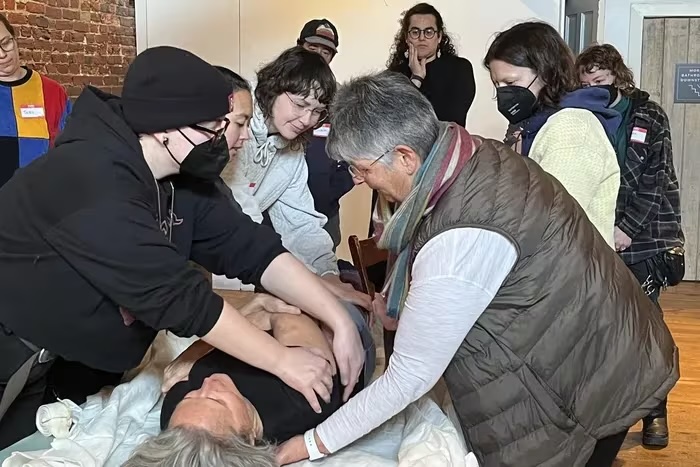— The idea that death and dying can be part of life, not handled by walled-off specialists in expensive facilities, has gained traction in recent years.

In a high-ceilinged, brick-walled space in Northern Liberties where people often host weddings, a group of strangers gathered on a recent Sunday to prepare for death.
They had come to learn how to shroud, part of a growing “death-positive” movement in Philly that seeks to demystify and de-commercialize the end of life. Many had been drawn to the hands-on workshop by fliers posted around the city that read, in part, “Yes, you heard that right! ‘Shroud’ as in wrapping a dead body for burial.”
Hosted at the MAAS building, the free event promised a shrouding demonstration (”on a live human”). It also served as the first meeting of a nascent “deathcare volunteer group,” which has aims to help Philadelphians who cannot afford funeral costs prepare and bury their loved ones. The median cost of funeral followed by burial in the mid-Atlantic region was $8,093 in 2021, according to the National Funeral Directors Association — a hefty sum for many families.
/cloudfront-us-east-1.images.arcpublishing.com/pmn/CWBUGU4ERJGLJDTQDWY3BIUAOA.jpg)
“I really want Philadelphia to be a death-positive hub on the East Coast,” said Isabel Knight, 29, the president of the National Home Funeral Alliance and the workshop’s organizer. In her vision, the grassroots group will wash and shroud the dead for free, and perhaps even transport bodies, in personal vehicles with burial permits, to cemeteries, Knight said.
Of actual burial or cremation, “That’s something that you’ve got to pay for, unfortunately,” she said.
The idea that death and dying can be part of life, not handled by walled-off specialists in expensive facilities, has gained traction in recent years. And the attendees at the shrouding workshop were not, on the whole, new to death — they included death doulas, a hospice music therapy worker, and a former palliative care doctor.
It was a practical meeting, but also something of a pep rally for people whose passion may not be the most popular at cocktail parties.
“I do a meditation where I visualize dying — and sometimes being cared for, and sometimes just being kind of abandoned on a cliff and decomposing,” said Natalia Stroika, 38, of South Philly, explaining to the group why she had come. “I got a lot of wisdom from that.”
Another attendee, a West Philly resident who goes by the name Ask Nicely, explained that he was in the process of growing flax in a burial ground in Upper Darby “so that I can learn to process it into fiber and then weave my own death shroud,” a comment that elicited an appreciative murmur from the crowd.
Many Jewish communities already have a volunteer burial society, or chevra kadisha, to ritually wash and prepare the dead for burial. Knight’s deathcare group will be for all religions, and particularly for those who cannot afford the high costs of the modern funeral.
/cloudfront-us-east-1.images.arcpublishing.com/pmn/EDUE57BCVJEIXEKDXC336U32RI.jpg)
Pat Quigley, 66, the supervisor of Laurel Hill funeral home and a member of the Reconstructionist Chevra Kadisha, or Jewish burial society, served as the shrouding instructor. She first reassured the group on two fronts: dead bodies do not immediately become too stiff to handle, and they do not instantly decompose.
Next was the practical matter of what to do. Everyone crowded around a pale green massage table at the front of the room; Kim Schmucki, 60, removed her shoes, revealing multicolored striped socks, and lay on the table, pretending to be dead. The group used a white linen-cotton shroud made by California company Kinkaraco, which Laurel Hill sells for roughly $900. Kinkaraco makes shrouds for a “green burial,” which means that everything about the body, the clothes, and the casket (if there is one) is biodegradable.
“Obviously we’re not going to suffocate Kim,” Quigley said, showing attendees how to roll her over and pull the shroud around her, but declining to pull it over her face. She offered a few “nifty little tricks” to keep eyes and mouths closed, advised attendees to support the head during the process, and showed the group how to tie the shroud tightly around the feet, waist, and upper body.
After the main demonstration, participants broke into smaller groups to try themselves. On the floor, a group carefully wrapped their volunteer corpse in a pale green sheet and rolled her back and forth, tied up with a bow.
“The whole death experience, like the whole birth experience, has become so medicalized and so sanitized,” said Quigley. “I think people just want something different.”
Complete Article ↪HERE↩!
